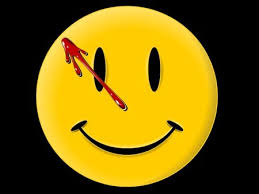 Quis Custodiet Ipsos Custodes (Who Watches the Watchmen?) is the final closing quote in the massive 12-issue compendium that is Watchmen. Since so much has been written regarding this graphic novel on the intrawebz already, I'll just quote a quick synopsis:
Quis Custodiet Ipsos Custodes (Who Watches the Watchmen?) is the final closing quote in the massive 12-issue compendium that is Watchmen. Since so much has been written regarding this graphic novel on the intrawebz already, I'll just quote a quick synopsis:
It tells the story of a group of past and presentsuperheroes and the events surrounding the mysterious murder of one of their own. Watchmen depicts superheroes as real people who must confront ethical and personal issues, who struggle with neuroses and failings, and who - with one notable exception - lack anything recognizable as super powers. Watchmen's deconstruction of the conventional superhero archetype, combined with its innovative adaptation of cinematic techniques and heavy use of symbolism, multi-layered dialogue, and metafiction, has influenced both comics and film.
So much has been written about the novel that is Watchmen that I feel that I can probably contribute very little in way of insight into the novel that has not been presented before. Any quick google search with the phrase "watchmen" will provide millions of hits deconstructing the themes and import of the novel over the course of the last 20 years. So, I think I will just offer some of my thoughts regarding the novel and what I gleaned from its pages. I will open myself up to many SPOILERS over the next few paragraphs. So, if you intend on seeing the movie, or reading the novel and don't want to know anything about it right now, please stop reading. I'll blog again soon something that you can enjoy.
Watchmen focuses on real people. Real fictional people. Let me explain. After WW2, there began a fad of "vigilante" heroes that cropped up in America. These people didn't have any special powers, but referred to themselves as heroes. They fought crime, dressed up in strange costumes, and did those things that we are familiar with in the typical "superhero" role. The one exception is Dr. Manhattan, who had his "intrinsic field" removed and is now an all powerful being. He is the lynch pin of American society, and due to this knowledge, they live in an alternate world where all cars are electric, and many other technologies exist that we don't even have in our wondrous age of 2009. It's interesting. It's world that is wholy wrong, and wholy challenging. While the world is far from our own, it's a world that seems plausible. Yes, I'm aware it's not real and never could be. But the way that the novel presents the world, it just feels like it could have happened that way had a few other things fallen differently.
Dr. Manhattan makes for the most interesting study for me. He can deconstruct objects with his mind, and remove the field from each object htat he comes in contact with. Another fascinating thing about him is his ability to see time as one. He sees no past, no future, no present ... he just perceives time. It is a complicated part of the world that Alan Moore has created. Manhattan tells people what they will be doing in hours, days, years from now. He perceives it all. He explains in one moment that it's not that he's taking choice away, he just sees the outcomes of the decisions, of the choices that we will make. It's not about control for Manhattan. It's about being able to see the results before they occur. In one particularly poignant moment, he travels to Mars to contemplate his own disconnect from humanity. He tells his entire history, bringing together every moment from his life as they overlap in time. He perceives the events as if they are occurring at the same moment, events which ultimately come together to lead him to where he is. Now, this may sound complicated, and it is, however, it is handled with a superb grace and subtlety as to make it seem to make sense. Hard to believe, I know.
Rorschach is the other character that I'd like to touch on. He's an absolutist. Absolutely believes in wrong versus right. When presented with the amazing acts of Adrian Veidt (the man who orchestrates the deaths of millions of New Yorkers in order to unite the world against a common enemy), he sees not the benefit that will come from this action. He doesn't comprehend that this will unite the world and prevent nuclear war with the Soviets (who are the major threat due to the lack of the Cold War). He sees only the right and the wrong. There is no utilitarianism in Rorschach's mind ... only good and evil. Ultimately, his end is fascinating in contrast with the world that has been created.
There are so many other things involved in this novel that I could talk about. From the iconoclastic Comedian, to the subtle undertones of powerlessness and fear that are involved in why these people step out to become "heroes".
Overall, just a fascinating analysis of the psyche of these so-called heroes.






1 comment:
Sorry I couldn't read your blog. But "vigilante" heroes losing their "intrinsic fields" are not concepts I can concentrate on. In the middle of your thoughts regarding Dr. Manhttan's special powers, I found myself considering whether I should put the rolls in the oven at 4:00 or 4:30, or if 14 rolls is even enough for five people. Generally, it would be, of course, but I make hecka tasty rolls.
What were talking about?
Post a Comment